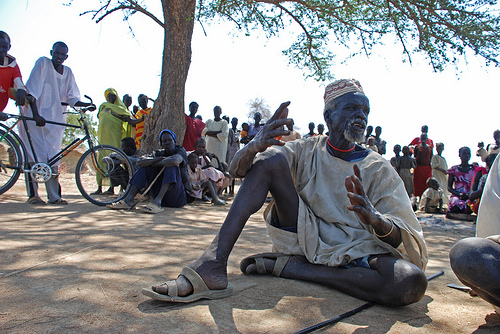
After stalling out last year, peace negotiations on the troubled region of Darfur are set to begin again next month. The A.U.-U.N. mediation team announced that talks between the Sudanese government and various rebel groups would start on April 18, and while timelines have carried little weight in previous rounds of the Doha process, this week saw some encouraging movement by rebel groups to consolidate their positions heading into the talks.
The Justice and Equality Movement, the strongest group militarily, signed a framework agreement with the Liberation and Justice Movement that lays out, in broad terms, their commitment to "continuing the dialogue to harmonize action" on negotiations, media relations, and their field and political positions. Just days later, JEM and the Sudan Liberation Army-Minni Minnawi put out a joint statement recognizing the “absolute conviction regarding necessity of uniting the resistance forces in Darfur.”
The paper commitments don’t necessarily instill much optimism; last year’s rounds of talks in Doha started out with what seemed like a breakthrough when JEM and the Sudanese government signed a framework agreement, but expectations quickly deteriorated. Some calculations may be shifting, though, along with developments in the wider region:
Libya-Darfur ties in flux: “Qaddafi may not have done the best things for Libya, but he has given much to the Darfur rebels,” a relative of JEM leader Khalil Ibrahim told Enough. The source said that recent developments in Libya and Qaddafi’s uncertain future factor into JEM’s calculations in the upcoming talks, because of JEM’s dependence on Libyan assistance. The group’s leader has been living in Libya ever since he was expelled from Chad and barred from returning to Darfur.
Qaddafi was welcoming to Sudanese generally and enabled the Darfur rebels to develop a strong network through which they could be assured access to basics like food and fuel. Libya’s unofficial support for the Darfur rebels (officially, Qaddafi backed the African Union’s position in defense of President Bashir) became even more essential when Sudan and Chad began mending ties, and the rebels could no longer depend on Chad as their rear base. It is difficult to say whether those who may succeed Qaddafi will be as accommodating. Certainly the treatment Sudanese received at the hands of Libyan rebels during the beginnings of the uprising should be cause for alarm among Darfuri rebels.
International community impatient for progress: After the drawn-out and ultimately ineffectual negotiations in Doha last year, the international community’s patience with the current process is wearing thin. Until recently, before the Doha forum looked as though it would be revived, actors and mediators were considering other options for moving the peace process forward. The government’s own proposal to “domesticate” the peace talks was roundly dismissed as a process that would be ripe for manipulation by the government and could prevent civil society groups from participating. Skepticism about the ability of the current forum to deliver a meaningful resolution remains, creating a distinct sense that a new approach must be pursued if this round of talks fails. Given the Sudanese government’s stated aim to resolve Darfur quickly, reinforced by its military offensive, there’s a possibility that a new course could put the rebels at a disadvantage.
Acknowledgement that fracturing was rebels’ downfall: The Justice and Equality Movement has been a capricious participant in talks, signing a ceasefire with the government in February 2010 that infused some hope that a political solution could be within reach in Doha. The ceasefire was quickly ignored, and JEM, for one, seemed uncertain about whether it was ready to talk or fight as the government escalated its assault on rebel strongholds. Other groups came and went from Doha last year, but in the end the process was undermined in large part by the inability of the rebel groups to settle on a common negotiating position. Instead, they insisted on maintaining separate tracks, thus weakening each of their positions vis-a-vis the government.
Recent agreements between rebel groups appear to acknowledge this downfall. Now the question is, will they hold? “What will make or break talks is if we see a joint delegation of rebel groups coming to the table with a joint position,” said Enough policy advisor Omer Ismail. “Second best would be separate delegations with one negotiating position.”
Over the coming weeks, we’ll see whether this scene can be set.
Photo: An elder from South Darfur describes fleeing the fighting in his village (Enough/Laura Heaton)

